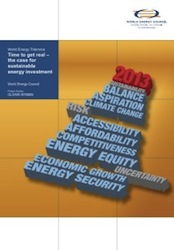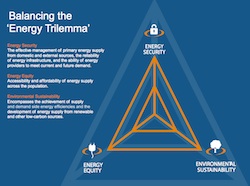The World Energy Council (WEC) has issued a 10-point action plan for how governments, industry, and key decision-makers should refocus their efforts and resources to achieve real progress in resolving the energy trilemma. The World Energy Congress is taking place  in Daegu, Korea this week. The report, “World Energy Trilemma: Time to get real – the agenda for change,” provides a detailed guide to creating a global policy framework that addresses the energy trilemma: energy security, energy equity, and environmental sustainability.
in Daegu, Korea this week. The report, “World Energy Trilemma: Time to get real – the agenda for change,” provides a detailed guide to creating a global policy framework that addresses the energy trilemma: energy security, energy equity, and environmental sustainability.
The WEC said the report is the culmination of the findings of a two-year World Energy Council study, “World Energy Trilemma,” conducted with Oliver Wyman, the management consulting firm. Recommendations from the past two years of study were the result of interviews with over 100 energy leaders in 41 countries, including chief executives, ministers, and heads of development banks.
“Governments face a daunting challenge to deliver secure, affordable and environmentally sustainable energy services,” said Joan MacNaughton, executive chair of the WEC’s World Energy Trilemma studies. “How well they meet it has a fundamental bearing on the social and economic prospects of their countries. Over the last two years our World Energy Trilemma study has identified what governments and energy leaders believe is needed to balance the energy trilemma.”
 MacNaughton noted that while leaders say they are ready to act now, they acknowledge the need for more guidance and support. “Our analysis provides the basis for countries to assess their political and institutional risk, and our new ‘Agenda for Change’ report describes how they can mitigate such risk and unlock the investment to deliver the required energy infrastructure. This subject will be the core of discussions between government and business leaders at the World Energy Congress,” added MacNaughton.
MacNaughton noted that while leaders say they are ready to act now, they acknowledge the need for more guidance and support. “Our analysis provides the basis for countries to assess their political and institutional risk, and our new ‘Agenda for Change’ report describes how they can mitigate such risk and unlock the investment to deliver the required energy infrastructure. This subject will be the core of discussions between government and business leaders at the World Energy Congress,” added MacNaughton.
The WEC’s 10-point Agenda for Change action plan includes:
Action 1: Connect the energy trilemma to the broader national agenda.
Action 2: Provide leadership to build consensus – nationally and globally.
Action 3: Improve policymaker dialogue.
Action 4: Increase engagement with the financial community.
Action 5: Minimise policy and regulatory risk and ensure optimal risk allocation.
Action 6: Adopt market-based approaches to carbon pricing to drive investments.
Action 7: Design transparent, flexible and dynamic pricing frameworks.
Action 8: Drive (green) trade liberalisation.
Action 9: Meet the need for more research, development & demonstration (RD&D).
Action 10: Encourage joint pre-commercial industry initiatives, including early large-scale demonstration and deployment.
According to the report, addressing strong demand growth, widening access to the 1.2 billion people currently not served by energy grids, and balancing the upgrade of aging infrastructure with environmentally progressive systems requires investment and coordination on an unprecedented scale. However, the impact of shale gas discoveries in more than 40 countries, cost breakthroughs in certain renewable technologies, and increasing the efficiency of transport, construction and household energy use could enable communities to live and work within a widely more sustainable energy landscape.

